I have a C# form. I am calling unmanaged functions from a C++ dll.
I have a callback called FUNDownDevCBEx this returns variables int nType, IntPtr pData.
So pointing to the struct _tagGPSMDVRInfo p = (_tagGPSMDVRInfo)Marshal.PtrToStructure(pData, typeof(_tagGPSMDVRInfo)); I can get the pointer variables.
However when I point to szIDNO I only get the last character of the string and I don't know why..
I expected szIDNO to show names incrementally but instead i only get the last char.
expected:
00091
00001
01211
01222
01504
what I got:
4
2
1
1
1
void FUNDownDevCBEx(int nType, IntPtr pData, Form1 form1) is the callback loop returning szIDNO
Any suggestions will be appreciated.
C++ typedef:
typedef struct _tagGPSInfo
{
int nID;
char szIDNO[32];
char szName[32];
char szSIMCard[16];
union
{
GPSInfo_S gDVRInfo;
GPSMobileInfo_S gMobileInfo;
GPSDVSInfo_S DVSInfo;
};
}GPSInfo_S, *LPGPSInfo_S;
C++ Callback looks like this:
void (CALLBACK * FUNDownDevCBEx)(int nType, void* pData, void * pUsr)
My C# conversion code:
[StructLayout(LayoutKind.Sequential, CharSet = CharSet.Ansi)]
public struct _tagGPSInfo
{
[MarshalAs(UnmanagedType.I4)]
public int nID;
[MarshalAs(UnmanagedType.ByValTStr, SizeConst = 32)]
public string szIDNO;
[MarshalAs(UnmanagedType.ByValTStr, SizeConst = 32)]
public string szName;
[MarshalAs(UnmanagedType.ByValTStr, SizeConst = 16)]
public string szSIMCard;
}
private void devlist_Click(object sender, EventArgs e)
{
try
{
IntPtr _lHandle = IntPtr.Zero;
NETClass.NETCLIENT_DEVOpenDevDownEx(ref _lHandle);
NETClass.NETCLIENT_DEVSetCharEx( _lHandle);
FUNDownDevCBEx _1callback = new FUNDownDevCBEx(FUNDownDevCBEx);
NETClass.NETCLIENT_DEVRegDevDownCBEx( _lHandle, this, _1callback);
NETClass.NETCLIENT_DEVStartDevDownEx(_lHandle, 0,0);
}
catch (Exception ex)
{
MessageBox.Show(ex.ToString(), "List Exception");
return;
}
}
static void FUNDownDevCBEx(int nType, IntPtr pData, Form1 form1)
{
try
{
_tagGPSInfo p = (_tagGPSMDVRInfo)Marshal.PtrToStructure(pData, typeof(_tagGPSInfo));
int nID = p.nID;
string szIDNO = p.szIDNO;
switch (nType)
{
case 0:
form1.Invoke((MethodInvoker)(() => form1.memoBox.AppendText(" DATA =" + pData + " nID=" + nID + " szIDNO=" + szIDNO + Environment.NewLine)));
break;
case 1:
//MessageBox.Show("GPS_DEV_DOWN_GROUP" + Environment.NewLine + " DATA =" + pData + " nID=" + nID);
break;
case 2:
//MessageBox.Show("GPS_DEV_DOWN_FAILED" + Environment.NewLine + " DATA =" + pData );
break;
case 3:
//MessageBox.Show("GPS_DEV_DOWN_SUC" + Environment.NewLine + " DATA =" + pData);
break;
case 4:
//MessageBox.Show("GPS_DEV_DOWN_RELATION" + Environment.NewLine + " DATA =" + pData + " nID=" + nID);
break;
default:
//MessageBox.Show("DEFAULT");
break;
}
//MessageBox.Show("nType= " + nType + " pData= " + pData);
NETClass.NETCLIENT_DEVStopDevDownEx(IntPtr.Zero);
NETClass.NETCLIENT_DEVCloseDevDownEx(IntPtr.Zero);
}
catch (Exception ex)
{
MessageBox.Show(ex.ToString(), "FUNDownDevCBEx Exception");
return;
}
}
my C# NETClass:
namespace ConversionTest
{
[UnmanagedFunctionPointer(CallingConvention.StdCall)]
public delegate void FUNDownDevCBEx(int nType, IntPtr data, Form1 form1);
class NETClass
{
[DllImport("libnetclient.dll", CallingConvention = CallingConvention.StdCall,SetLastError = true)]
public static extern int NETCLIENT_DEVOpenDevDownEx(ref IntPtr lpHandle);
[DllImport("libnetclient.dll", CallingConvention = CallingConvention.StdCall, SetLastError = true)]
public static extern int NETCLIENT_DEVRegDevDownCBEx( IntPtr lHandle, Form1 form1, FUNDownDevCBEx _callback);
[DllImport("libnetclient.dll", CallingConvention = CallingConvention.StdCall, SetLastError = true)]
public static extern int NETCLIENT_DEVStartDevDownEx( IntPtr lHandle, int nMgrType, int nDevType);
[DllImport("libnetclient.dll", CallingConvention = CallingConvention.StdCall, SetLastError = true)]
public static extern int NETCLIENT_DEVStopDevDownEx( IntPtr lHandle);
[DllImport("libnetclient.dll", CallingConvention = CallingConvention.StdCall, SetLastError = true)]
public static extern int NETCLIENT_DEVCloseDevDownEx( IntPtr lHandle);
[DllImport("libnetclient.dll", CallingConvention = CallingConvention.StdCall, SetLastError = true)]
public static extern int NETCLIENT_DEVSetCharEx( IntPtr lHandle, bool bUtf8 = true);
}
}
